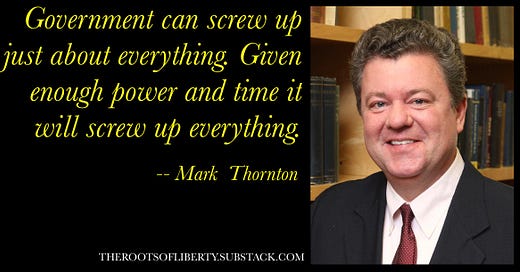EDITOR’S NOTE: A few years ago, I penned a first draft of a short book, “End The War On Drugs” I offer an updated version, in serial form, here on Substack, for my paid subscribers. I will publish a chapter each week.
CHAPTER 1: A Catastrophic Failure
CHAPTER 2: A Brief History
CHAPTER 3: A Society Rooted in Individual Liberty
CHAPTER 4: Use vs Abuse
CHAPTER 5: Societal Cost
CHAPTER 6: Use and Addiction
CHAPTER 7: Free To Choose
CHAPTER 8: Prohibitions Create Business Opportunities
CHAPTER 9: Inner City Youths and the Permanent Stigma of Drug Convictions
CHAPTER 10: Prisons and the Corrections Industry
CHAPTER 11: Law Enforcement and the Militarization of Police
CHAPTER 12: Asset Forfeiture
CHAPTER 13: Expatriation of Dollars and Destabilization of Foreign Governments
There are countless ways that legalization might unfold. It is extremely likely that marijuana will be completely before any other currently banned drug, for reasons that include marijuana's perception vs that of "hard drugs," the medicinal uses of marijuana, the commonness of its use and the fact that legalization has already happened in thirty-seven.
The fallout of cannabis legalization - how the government chooses to regulate pot, how it unrolls the changeover, how the drug cartels react, what happens in the inner cities and poor neighborhoods, how the special interests that oppose legalization react, and the nature of the ensuing hue-and-cry, sturm-und-drang - will contribute mightily to the debate about legalization of other drugs.
Unfortunately, the universal problem of government screwing up everything it touches is apt to harden many minds against further legalization. While it’s not fair to judge the “kinda sorta halfway” legalization that we see today, because pot remains illegal at the federal level and therefore the DEA, FBI, etc. can raid a state-legal business on a whim, we do have examples of the states themselves making a hash of what should be relatively easy. Because there is no more dangerous place to be than between a politician and Other People’s Money, we have multiple examples of states’ greed leaving the risk premium associated with selling product illegally low enough so that the legal doesn’t fully displace the black market.
Where is there a black market in tobacco? Almost exclusively in the states that tax it so heavily that there’s money to be made selling untaxed or counterfeit cigarettes (see: New York, where 60% of all cigarettes sold are illicit).
The lesson there is screamingly obvious, but politicians won’t heed it.
Keep reading with a 7-day free trial
Subscribe to The Roots of Liberty to keep reading this post and get 7 days of free access to the full post archives.



